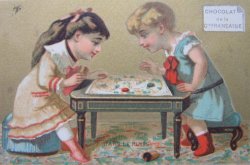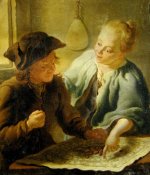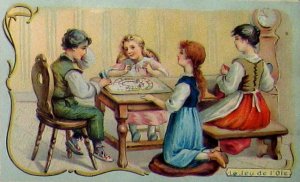Giochi dell'Oca e di percorso
(by Luigi Ciompi & Adrian Seville)
(by Luigi Ciompi & Adrian Seville)

|
Giochi dell'Oca e di percorso
(by Luigi Ciompi & Adrian Seville) |

|
 |

Torna alla ricerca giochi (back to game search) |
 |
| Historical Pastime or a New Game of the History of England from the Conquest to the Accession of George the Third | ||
 |
Versione stampabile
 |
Invia una segnalazione

|
                        |
primo autore: | Non indicato |
| secondo autore: | Harris John | |
| anno: | 1803 | |
| luogo: |
Inghilterra-Londra |
|
| periodo: | XIX secolo (1°/4) | |
| percorso: | Percorso di 158 caselle numerate | |
| materiale: | carta incollata su tela (engraving on paper with linen backing) | |
| dimensioni: | 556X493 (565X525) | |
| stampa: | Litografia (litographie) (engraving) | |
| luogo acquisto: | ||
| data acquisto: | ||
| dimensioni confezione: | ||
| numero caselle: | 158 | |
| categoria: | Personaggi ed eventi storici | |
| tipo di gioco: | Gioco di percorso | |
| editore: | J. Harris, Corner St. Paul's Church Yard & J. Wallis 16 Ludgate Street | |
| stampatore: | J. Harris, Corner of St. Paul's Church Yard & J. Wallis 16 Ludgate Street 1803 | |
| proprietario: | Collezione A. Seville | |
| autore delle foto: | A. Seville | |
| numero di catalogo: | 542 | |
| descrizione: |
Gioco di 158 caselle numerate, circolare, orario, centripeto con al centro l'immagine di Giorgio III. Realizzato il primo Dicembre del 1803 da John Harris insieme a John Wallis questo gioco raccoglie nei medaglioni un gran numero di avvenimenti e personaggi. I dettagli di tutti i re e le regine da Guglielmo 1° a Giorgio III° sono contenuti in un libretto. I medaglioni sono colorati con un unico colore fra i soliti quattro utilizzati per questi giochi (blu, verde, rosa, giallo). REGOLE: non riportate sul tavoliere. CASELLE: con didascalia. PERSONAGGI: Robin Hood (Legendary character); William I King of England, 1027 or 8-1087; William II King of England, 1056?-1100; Henry I King of England, 1068-1135 ); Thomas à Becket, Saint, 1118?-1170; Anselm Saint, Archbishop of Canterbury, 1033-1109; Stephen King of England, 1097?-1154; Matilda Empress, consort of Henry V, Holy Roman Emperor, 1102-1167; Henry II King of England, 1133-1189; Richard I King of England, 1157-1199; John King of England, 1167-1216 ); Innocent V Pope, ca. 1224-1276; Henry III King of England, 1207-1272; Edward I King of England, 1239-1307; Bacon, Roger, 1214?-1294; Edward II King of England, 1284-1327; Gaveston, Piers, ca. 1284-1312; Edward III King of England, 1312-1377; Mortimer, Roger de Earl of March, 1287?-1330; Wycliffe, John, d. 1384; David II King of Scotland, 1323 or 4-1370 or 1; Richard II King of England, 1367-1400; Henry IV King of England, 1367-1413; Henry V King of England, 1387-1422; Henry VI King of England, 1421-1471; Joan of Arc, Saint, 1412-1431; Eleanor of Gloucester, Duchess, 1391-1447; Edward IV King of England, 1442-1483; Beauchamp, Richard de Earl of Warwick, 1382-1439; Edward V King of England, 1470-1483; Richard III King of England, 1452-1485; Henry VII King of England, 1457-1509; Warbeck, Perkin, 1474-1499; Henry VIII King of England, 1491-1547; Catharine of Aragon, Queen, consort of Henry VIII, King of England, 1485-1536; Wolsey, Thomas, 1475?-1530; Anne Boleyn Queen, consort of Henry VIII, King of England, 1507-1536; Jane Seymour Queen, consort of Henry VIII, King of England, 1509?-1537; Anne of Cleves, Queen, consort of Henry VIII, King of England, 1515-1557; Catharine Howard Queen, consort of Henry VIII, King of England, d. 1542; Catharine Parr Queen, consort of Henry VIII, King of England, 1512-1548; Somerset, Edward Seymour Duke of, 1506?-1552; Mary Queen of Scots, 1542-1587; Grey, Jane Lady, 1537-1554; Bonner, Edmund, 1500?-1569; Cranmer, Thomas, 1489-1556; Elizabeth I Queen of England, 1533-1603; Shakespeare, William, 1564-1616; James I King of England, 1566-1625; Raleigh, Walter, 1586-1646; Charles I King of England, 1600-1649; Cromwell, Oliver, 1599-1658; Cromwell, Richard, 1626-1712; Charles II King of England, 1630-1685; James II King of England, 1633-1701; Monmouth, James Scott Duke of, 1649-1685; Mary II Queen of England, 1662-1694; William III King of England, 1650-1702; Locke, John, 1632-1704; Newton, Isaac Sir, 1642-1727; Anne Queen of Great Britain, 1665-1714; Marlborough, John Churchill Duke of, 1650-1722; George I King of Great Britain, 1660-1727; George II King of Great Britain, 1683-1760; Pope, Alexander, 1688-1744; George III King of Great Britain, 1738-1820; Anne of Cleves, Queen, consort of Henry VIII, King of England, 1515-1557; Robert Duke of Normandy; Alexander Pope. NOTA: Vedi anche esemplare arch. n°2316. REFERENZA 1 V&A Museum. This historical race game has 158 playing spaces numbered in a clockwise direction. They represent events and characters in English history from William I to George III. The game was devised specifically for the education of young children and the author of the booklet was very keen that children should benefit from playing the game. He hopes that 'the hours he has devoted to the formation of this little Scheme, have not been spent in vain'. Design: engraving, coloured by hand showing 158 medallions representing events and characters in English history; 12 sections mounted on linen N°of squares: 158 Squares illustrated: all Square numbering: all Squares titled: all in booklet Subject of starting square: Norman Conquest, 1066 Subject of ending square: Accession of George III 1760 Place of Origin: London Date: 01/12/1803 Artist/maker: Harris, John; Wallis, John Materials and Techniques: Hand-coloured engraved paper on linen Dimensions: Length: 56.5 cm; width: 52.5 cm Object history note: slip case label shows the union jack on the left, the royal standard on the right, below the lion and unicorn and military trophies. Title is in an oval between them and surmounted by an electoral bonnet. John Harris took over the publishing firm of Elizabeth Newbery in 1801, primarily producing games, but also a few dissected puzzles. His address was the same at the Corner of St. Paul's Churchyard with the title `Original Juvenile Library'. In 1843 he sold the business to Grant & Griffiths. Historical context note Rewards: receipt of counters, forward movement; counters are paid to the Treasury but those in medallions can be picked up when a played lands Forfeits: payment of counters, backward movement, counters to the paid to the Treasury and also individual medallions according to the rules N°of Players: any Equipment required: teetotum, 1 to 8; 12 markers with letters of the alphabet; counters to be used as stakes. Rules: RULES AND DIRECTIONS FOR PLAYING THE HISTORICAL PASTIME OR NEW GAME OF THE HISTORY OF ENGLAND WITH A SHORT ACCOUNT OF THE PRINCIPAL EVENTS WHICH HAVE OCCURRED FROM WILLIAM THE CONQUEROR TO THE ACCESSION OF GEORGE THE THIRD. London PRINTED FOR J HARRIS, CORNER OF ST. PAUL'S CHURCH YARD AND J WALLIS NO 13 WARWICK SQUARE 1810. PRINTED BY H BRYER, BRIDGE STREET, BLACKFRIARS, LONDON. ADVERTISEMENT The utility and tendency of this Game must be obvious at first sight; for surly there cannot be a more agreeable study than History, and none more improving to Youth, than that which conveys to them, in a pleasing and comprehensive manner, the Events which have occurred in their own country. The little Prints, which are regularly numbered from 1 to 158, represent either Portraits of the principal Personages who have signalised themselves as Kings, Statesmen, Churchman, Generals, Poets &c., &c. or some remarkable Occurrence in our country. -This will naturally excite a curiosity in the youthful mind; and that curiosity will be gratified in to short account of each reign subjoined. -On the whole, the writer flatters himself, that the public approbation will convince him, that the hours he has devoted to the formation of this little Scheme, have not been spent in vain. RULES AND REGULATIONS FOR PLAYING THE HISTORICAL GAME This game comprehends nearly one hundred and sixty of the principal circumstances in the History of England, commencing with the Battle of Hastings and ending with the Accession of George the Third, with appropriate Fines or Rewards, to most of the subjects. It is played with a teetotum, numbered from 1 to 8. Each player proceeds in the Game according to the number he turns, and receives the Reward or pays the Fine appointed. There are likewise twelve Letters, one of which each player must draw; and he who draws the earliest in the Alphabet, takes the privilege of turning first, and the others in rotation. Each player must place his Letter on the circumstance to which he turns, to show his situation in the Game. If any player turns to the subject on which another has his Letter, he takes that place and the other moves one forward, except at the Holy Land, where as many may be placed as chance may send. Each player advances in the Game by adding the Figure that he turns to the Number on which his Letter stands. Any number of persons may play; and he who arrives first at the Treasury, wins the Games, takes the Stakes and all forfeits that remain. EXAMPLE Suppose George, Charles and James play the Game, George draws B, Charles F, James H, they each put a stake into the Treasury. George having the earliest letter in the alphabet, spins first No. 3, places his Letter on the Briton, and pays a fine of one to the Norman.-Charles turns next No. 6, from which he derives no advantage, because every player must enter Doom'sDay Book before he can proceed.-James next turns No. 4, takes the fine from the Norman, and passes to Doom'sDay Book.-George then plays again, and turns No. 2, takes his letter from the Briton, and places it on Doom's Day Book; in consequence, James passes his Letter one forward, to the forest and pays a fine to the king. *Reducing the period covered allowed the publishers to go into greater detail about the history that they and the buying public felt had determined their country. Rules placement: booklet, printed by H. Bryer Bridge Street, Blackfriars, London, 1810. Descriptive line: Hand coloured historical race game, Historical Pastime, published in England by John Harris and John Wallis in 1803 Attribution Note: Booklet printed by H Bryer Bridge Street, Blackfriars, London, 1810 REFERENZA 2 WHITEHOUSE, Francis Reginald Beaman, (pag. 27): HISTORICAL PASTIME or a new Game of the History of England from the Conquest to the Accession of George the Third. Published by J. Harris, corner of St. Paul’s Church Yard and J. Wallis, 16, Ludgate Street. As the Act directs Dec. 1st 1803. How many editions were published is uncertain, but Books of Rules carry various dates up to 1806. The game is an engraving size 21in X 22 ¼ in, hand-coloured and mounted in 12 sections on linen, contained in slip-in case. Like all these “Historical Pastimes”, it follows a snail-shell type of track composed of a large number of small circles, with the exception of the “Jubilee” game, rulling clockwise until the centre is reached. It has 157 circles and terminates in an oval portrait of King George III. REFERENZA 3 "Réduire la periode couverte a permis aux éditeurs d'approfondir les détails de l'histoire qu'eux-meme et le public pensaient déterminants pour le pays. Le 1er décembre 1803, John Harris conjointement avec John Wallis, a édité Jeux historique ou Un nouveau jeu de l'histoire de l'Angleterre. Celui-ci montre 158 médaillons représentant un grand nombre d'événements et de personnages, chacun d'eux étant répertorié dans le mode d'emploi. Les détails sur tous les roi et reines, allant de Guillaume 1er à George III se trouvent dans le livret. Dans ce jeu, qui est une gravure, les médaillons sont peints en une couleur unique- bleu, rose, vert ou jaune- plutot que rehaussés avec des couleurs appropriées". (GOODFELLOW Caroline) REFERENZA 4 "Reducing the period covered allowed the publishers to go into greater detail about the history that they and the buying public felt had determined their country. On December 1st, 1803 John Harris, in conjunction with John Wallis, published "Historical Pastime or A New Game of the History of England". It shows 158 medallions representing all types of events and characters, each of which is listed in the accompanying rules booklet together with directions of play. Also in the booklet are details of all the kings and queens from William I to George III. In this game, which is an engraving, the medallions are painted in one of four colours- blue, pink, green or yellow- rather than being highlighted with appropriate colours." (GOODFELLOW Caroline) REFERENZA 5 "Historical pastime or a new game of the history of England from the Conquest to the Accession of George the Third" (Bodleian Libraries) |
|
| bibliografia: |
1) GOODFELLOW, Caroline: "Jeux de société. Le guide du collectionneur des jeux de société depuis le XVIIIe siècle jusqu’à nos jours", (Edizione francese) Carrousel MS, 2001. 2) GOODFELLOW, Caroline:"A Collector's Guide to Games and Puzzles" Secaucus, New Jersey, Chartwell Books-London, Quintet Publishing Limited 1991. 3) GOODFELLOW, Caroline:"The Development of the English Board Game, 1770-1850", in Board Games Studies 1, 1998. 4) SEVILLE, Adrian:"The sociable Game of the Goose" in "Board Games Studies Colloquia XI", 23-26 Aprile 2008, Lisbona - Portogallo 2008. 5) WHITEHAUSE, F.R.B.:"Table Games of Georgian and Victorian Days", London, Peter Garnett, 1951 (pag. 25). |
|
| "The Development of the English Board Game, 1770-1850" (Caroline G. Goodfellow) | ||
| Historical Games. "Table Games of Georgian and Victorian Days". (Francis Reginald Beaman, Whitehause) | ||
Vai alla ricerca giochi Vai all'elenco autori